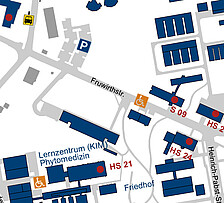In Germany, a distinction is made between state and private childcare facilities. The differences are particularly noticeable in the fees, and only children who are resident in Stuttgart may be enrolled in state childcare facilities in the city.
Places are usually allocated in September, when school enrollment takes place. Children are often allocated as early as March and many childcare facilities already have long waiting lists. In other words, it is paramount to consider childcare in a timely manner.
As an alternative to childcare facilities, there are childminders who usually offer childcare in their own homes. Childminders are certified and authorized to care for children. Parent-child groups are another alternative. Here, private childcare is organized by parents, usually with the support of educational staff.
Provision offered by the university
The University of Hohenheim offers a range of provision for members of the university.
Overview of provision in and around Hohenheim
All children in Germany between the ages of 6 and 16 must attend school.
Primary Schools
The school year begins in September. Children are required to go to school when they are 6 years old. In March, you will receive a registration date from the school in your district. On that day, you will need to go to the school with your child, where you will often be served coffee and cake, and officially register your child for school.
If you have decided to send your child to another school, you will first need to register with the school in your district and then when you go to the appointment to register, state that you will be changing schools. You will then receive a request to change schools and will have to give very good reasons for wanting to send your child to a different school. Knowing about a better school is not considered a reason.
The request to change schools will be reviewed by the school and sent to the school you would like your child to go to. As soon as both schools have signed the request, it will be sent to the responsible education authority for review. You will then receive a confirmation of the change in school from the education authority, and your child will be automatically registered at the new school.
Secondary Schooling
After 4th grade, children can be sent to one of four different types of schools:
- “Hauptschule” (general school): “Hauptschule” leaving certificate after 9th or 10th grade
- “Realschule” (secondary school): “Realschule” leaving certificate after 10th grade
- “Gymnasium” (upper secondary school): “Abitur” after 12th grade (requirement for studying at a university)
- “Gesamtschule” (comprehensive school): All three types of schools combined into one school. The children are separated according to performance levels.
All children can attend state schools for free. Besides state schools, there are also many private schools that you must pay to attend.
Schools in Stuttgart
If you have children, you will receive financial support from the state while in Germany. With some restrictions, this also applies to international guests who are in Germany for at least three months. The most important thing is that at least one of the parents has a taxable income in Germany.
You can receive more information and support in applying for this financial support at the Welcome Center. The Federal Ministry for Education, Family Affairs, Seniors Citizens, Women and Youth is responsible for allocating these funds.
Child Benefit
Child benefits are typically paid when the primary or usual place of residence of the person submitting the application is in Germany. The child’s primary or usual place of residence must also be in Germany or a European Union member state. If the applicant’s place of residence is not in Germany, then there might still be a right to receive child benefits if the applicant is fully taxable for income tax in Germany.
Under certain conditions, there might also be a right to child benefits if the usual place of residence is outside of Germany or if income is earned there, but these exceptional cases can only be determined once an application has been submitted to the Family Benefits Office (“Familienkasse”) at the Federal Employment Agency.
Child benefits are paid at least until the child is 18 or until they turn 25 if the child is in a school or vocational education program or studying.
As of the 1st of January 2025, child support in the amount of 255€ a month is granted to every child.
The application must be submitted in writing to the Family Benefits Office (Familienkasse) responsible for your place of residence.
More Information can also be found here:
Citizens of the EU / EEA
Citizens of the European Union (EU), the European Economic Area (EEA) and Switzerland can receive child benefit regardless of whether they have a settlement permit or residence permit. The same applies to nationals of Serbia and Montenegro, Bosnia-Herzegovina, Morocco, Tunisia, and Turkey on the basis of the respective intergovernmental agreements if they are employed in Germany as an employee subject to unemployment insurance, or receive unemployment benefit or sickness benefit, for example.
Contract workers and employees who have been sent to Germany by their foreign-based employer to provide temporary services are not entitled to child benefit, even if they have a settlement permit or residence permit for work purposes.
Non-EU Citizens
Foreigners who live in Germany on a permanent basis can receive child benefits if they have a valid residence permit for certain purposes - this includes the residence permits and permanent residence permits granted until the end of 2004.
(Source: EURAXESS)
Parental Allowance
The parental allowance makes up for the loss of income after the birth of a child.
Only mothers and father who meet the following criteria are entitled to parental allowance:
- they care for and raise their child themselves after the birth,
- they do not work more than 30 hours per week,
- they live together in the household with their child, and
- they have a residence or typically stay in Germany.
More information


